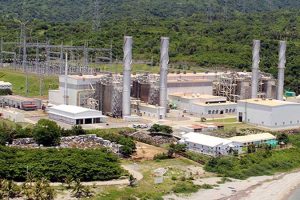Charter change may not be needed if PSA law is implemented — experts

By Kyle Aristophere T. Atienza and John Victor D. Ordoñez, Reporters
ECONOMISTS and policy experts urged the Marcos administration to fully implement and harness the potential of the amended Public Service Act (PSA), which opens up the economy without changing the current Constitution.
“If Cha-cha (charter change) is off the table, then there must be a concerted effort to implement the Public Service Act to the fullest. On this score, it’s not really opening up new sectors to foreign investors,” Michael Henry Ll. Yusingco, a policy analyst, said in a Facebook Messenger chat.
“It’s really more about doing the required work to ensure the PSA is implemented properly.”
The amended PSA, signed by then-President Rodrigo R. Duterte in March 2022, allows full foreign ownership in telecommunications, domestic shipping, railways and subways, airlines, expressways and tollways, and airports.
The sectors were previously subjected to the 40% foreign ownership cap for public utilities under the Constitution.
It took almost a year for the National Economic and Development Authority to release the implementing rules and regulations of the amended PSA, which took effect on April 4.
“The PSA shows a potential way of expanding our economic opportunities without revising or amending the 1987 Constitution,” Emy Ruth D. Gianan, who teaches economics at the Polytechnic University of the Philippines, said via Facebook Messenger chat.
Amending or revising the Constitution requires “a tricky balance between political and economic incentives,” she said. “Lack of support from the supposed main stakeholders of the amendments on key economic provisions in the constitution should signal to Congress not to overwork the proposal.”
The constitution can be modified either through amendments or revisions. Amendments would not affect the overall structure and basic principles of the Constitution, while revisions would alter the structure.
President Ferdinand R. Marcos, Jr. has not included Cha-cha in his list of legislative priorities, but some of his allies in Congress continue to push for it.
The House of Representatives last month passed a resolution calling for a constitutional convention (con-con) that would propose amendments to the economic provisions of the Constitution.
Senate committee on constitutional amendments Chair Robinhood Ferdinand “Robin” C. Padilla, on the other hand, wants to amend the charter through a constituent assembly.
With a constituent assembly, Congress itself would enact amendments or revisions to the constitution with a three-fourths vote of all its members.
At present, only three out of the 24 senators support the Cha-cha proposal.
“Congress is powerful enough to introduce economic measures without taking the more complex route of Cha-cha,” Ms. Gianan said.
Leonardo A. Lanzona, an economics professor at the Ateneo de Manila University, said there have already been laws that circumvented the foreign ownership restrictions.
“It seems that these restrictions no longer pose as binding constraints for foreign investments,” he said via Messenger chat.
Aside from the PSA amendments, Mr. Duterte signed into law the Foreign Investments Act, which relaxed restrictions on foreign companies, and the Retail Trade Liberalization Act, which lowered the required paid-up capital for foreign retail enterprises.
‘HUGE MISTAKE’Lack of public trust is a major hurdle in the push for an economic Cha-cha, with lawmakers being accused of using this to introduce political amendments.
“The current move made a huge mistake, employing the same strategy used in the past failed attempts. That is to just railroad the process. To skip the hard part of earning the public’s trust first,” Mr. Yusingco said.
He noted that Mr. Padilla had not presented any new arguments that would change the mind of other senators, who currently do not support the measure.
Mr. Yusingco, who believes the charter needs to be updated, asked lawmakers to “reconsider the FDI (foreign direct investment) angle” in convincing the public to support Cha-cha.
“Simply removing foreign ownership restrictions would not bring in more FDI to the country because there are other obstacles that must be addressed as well.”
Ms. Gianan said there must be a “more inclusive” discourse about foreign ownership.
“There are pros and cons to foreign ownership, but because we’re only able to listen to extremely against or supportive views to this measure, the public tends to hold polarized views,” she said.
Mr. Lanzona said there is no convincing argument that opening the economy to foreign investments would have a negative impact.
“But the main concern is the political changes that can be made with Cha-cha,” he added.
On April 1, Mr. Padilla released a list of his committee’s proposed amendments to the charter, including full foreign ownership of land.
He asked Congress to pass a law allowing foreign nationals to acquire private land not exceeding 1,000 square meters and allowing foreign corporations to acquire rural land not exceeding five hectares.
“Owning lands is not the only way foreigners can invest,” Antonio A. Ligon, a law and business professor at De La Salle University, said in a text message when asked to comment on the proposal.
“A good and stable economic, social and political climate in fact is more important in making a decision to invest in the country.”
Bernardo M. Villegas, a member of the convention that wrote the 1987 Constitution, earlier told BusinessWorld that allowing full foreign ownership of land isn’t a prerequisite for improving farm productivity.
He noted that “foreigners are not interested in owning land for agriculture,” adding they are content with leasing land for their large-scale plantation projects.
Instead of pushing for full foreign ownership of land, lawmakers should focus on passing laws that would boost the country’s manufacturing sector and overall employment, said Jose Enrique A. Africa, executive director of think tank IBON Foundation.
“Allowing foreign ownership will put pressure on land prices, distort land and property markets, and worsen inequalities in ownership against Filipinos,” he said in a Viber message.
“The underlying premise that foreign direct investment is some kind of magic bullet for development is so wrong and should be much more critically looked at, especially because it’s being used to justify misguided economic policies.”




